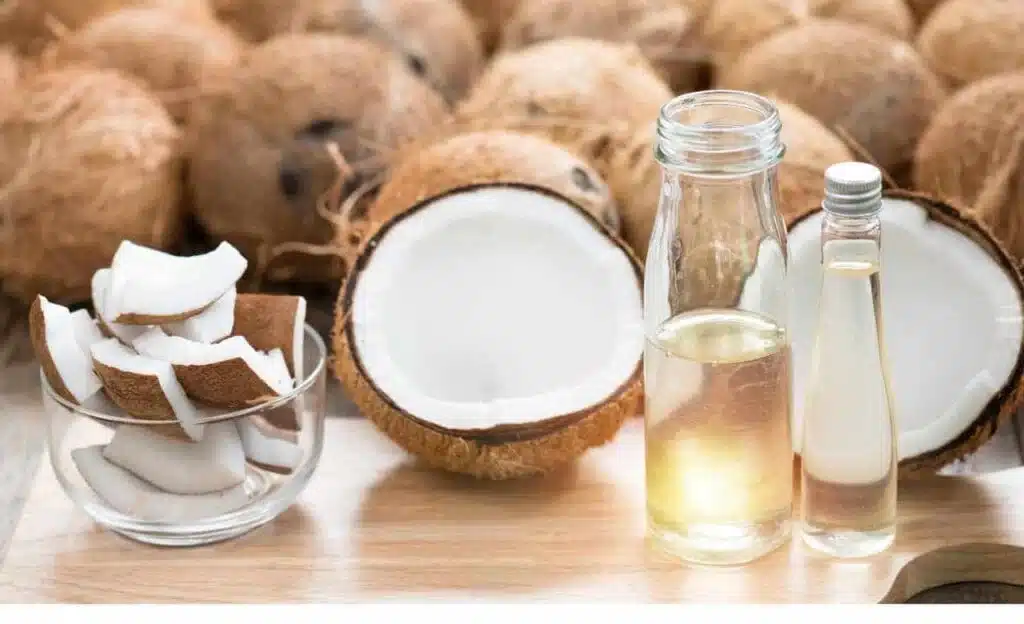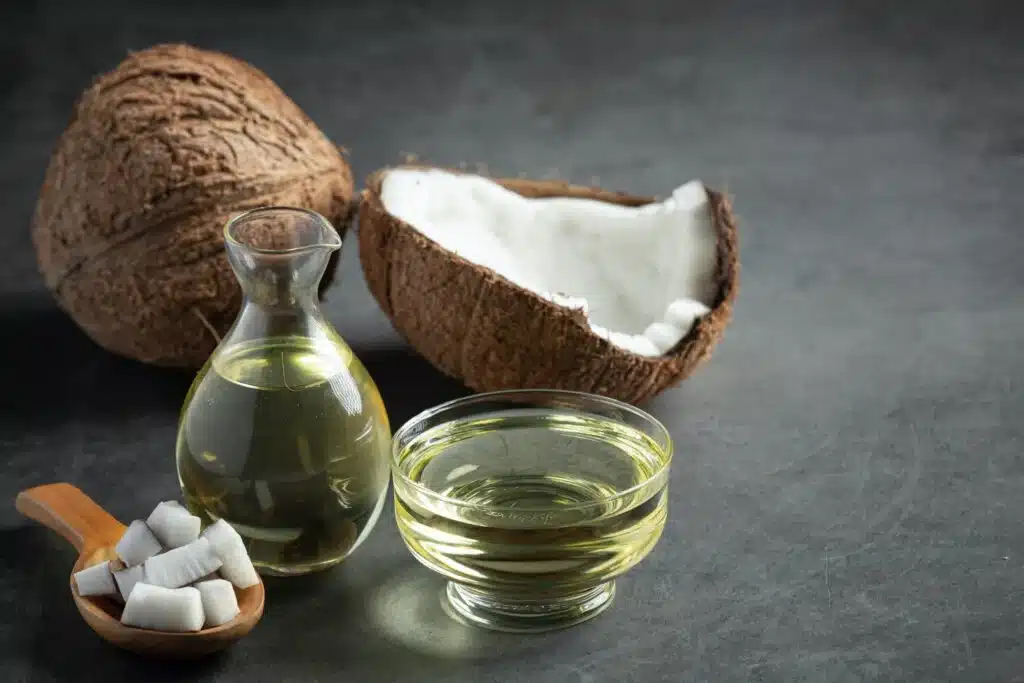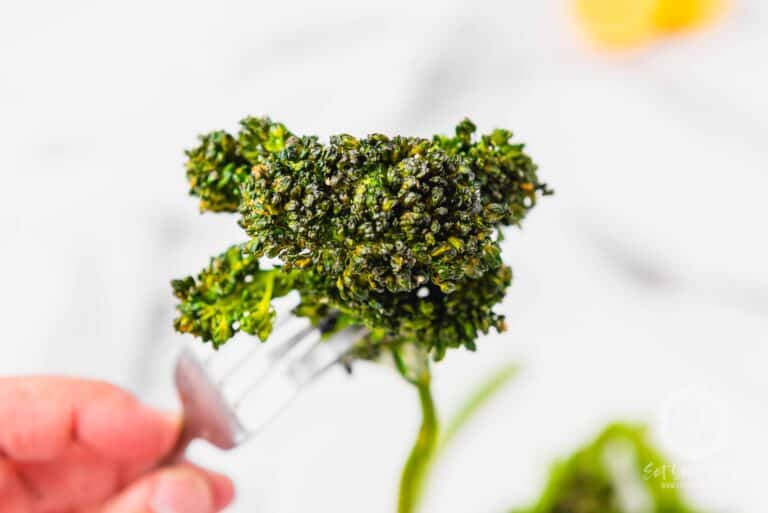Does Coconut Oil Go Bad?
Are you as obsessed with coconut oil as we are? Does Coconut Oil Go Bad? This is a question we have set out to answer for you. Coconut Oil is a superfood that has been touted as a miracle remedy for everything from acne to hangnails, and the flavor is delicious in cookies, smoothies, curries – just about anything!
But like other fats and oils, coconut oil can go bad. So how do you know if your coconut oil has gone bad and should be thrown out? Read on to discover what happens when coconut oil goes bad – plus learn some tips for keeping it fresh longer.

Contents
Does Coconut Oil Expire?
Unlike other cooking oils, such as vegetable oil, Coconut oil boasts a naturally long shelf life. This is mainly due to the stability of its fatty acid chains. These chains are highly saturated, making them less likely to oxidize and, therefore, more spoilage-resistant.
While it’s true that coconut oil can eventually go bad, it typically lasts for about two years if stored properly. This longevity makes coconut oil a reliable staple in many kitchens, especially compared to other oils that tend to go rancid more quickly. However, checking for signs of spoilage like color, texture, or smell changes is always important.

Does Extra Virgin Coconut Oil Expire?
Yes, like most edible products, virgin coconut oil does expire. However, it is known for its impressively long shelf life compared to other oils.
The longevity of virgin coconut oil can be attributed to its high-fat content. The oil’s quality and safety depend on proper storage methods.
It can retain its quality for a long time if stored correctly.
How Do You Know if Coconut Oil Has Gone Bad?
These are the signs to look out for when identifying bad coconut oil:
- Expiration Date: Always verify the expiration date on the bottle or jar. Expired coconut oil may not necessarily be bad, but it’s a good first indicator of its quality.
- Natural Coconut Scent and Flavor: Fresh oil has a natural coconut flavor and scent. It might have gone bad if the oil no longer smells or tastes like coconut.
- Sour Smell or Taste: If your coconut oil tastes sour, this is a clear sign that it’s spoiled. Good coconut oil should have a neutral scent and taste when it’s not flavored.
- Change in Color: Coconut oil should be clear when it’s in liquid form and white when it’s solid. If the oil starts to turn yellow or has dark oil spots, it’s probably spoiled.
- Mold Growth: This is a sign that your coconut oil has gone bad. If you see any signs of mold growth, discard the oil immediately.
- Texture Changes: Coconut oil should maintain a smooth consistency. If it feels grainy or similar to curdled milk, it’s likely spoiled.
Is It Ok to Use Old Coconut Oil?
Coconut oil is known for its longer shelf life if stored correctly. However, the oil quality may deteriorate as time passes, leading to a rancid odor, a clear sign of spoilage.
When coconut oil surpasses its expiration date, it could become a hub for dangerous bacteria, escalating the chances of food-related diseases.
So, while using old or expired coconut oil alone isn’t necessarily dangerous, checking for signs of spoilage, such as a rancid odor, is crucial before use. Also, proper storage is key to extending its lifespan.
How Long Does Coconut Oil Last Once Opened?
Once opened, it can last up to two years, depending on the type and how it’s stored.
However, the lifespan can differ slightly, with refined coconut oil lasting about 18-36 months, while extra virgin coconut oil that can last three to five years.
It’s important to note that coconut oil takes a long time to oxidize, which means it takes a long time to go bad. But as with any other food product, it’s always good to check for signs of spoilage, like color, smell, or taste changes.
How Long Can You Keep Coconut Oil?
Generally, with proper storage, it can maintain its quality for a duration ranging between 2 to 3 years.
This is because coconut oil takes significant time to oxidize, meaning it doesn’t go bad quickly.
Some sources suggest that coconut oil can last between 2 to 5 years with appropriate storage, giving it one of the longest shelf lives among oils.
Several factors must be considered to ensure the longest shelf life of your coconut oil in the best condition. One of these is light exposure.
Store your coconut oil in a cool and dark location, avoiding direct sunlight exposure.
Exposure to heat and light can accelerate oxidation, leading to quicker spoilage.

Use clean utensils when handling your coconut oil, and consider buying in smaller volumes to minimize waste.
To prevent contamination that could speed up spoilage, always ensure that your hands or spoons used to scoop out the oil are clean.
Storage containers are another important factor. Preserving coconut oil in a sealed container to minimize its contact with air can reduce oxidation risks and increase its shelf life. Glass jars with tight lids are often recommended for this purpose.
How to Properly Store Coconut Oil?
Here’s how you store your coconut oil to increase its shelf life:
In the Pantry:
- With a naturally long shelf life of up to two years, coconut oil is suitable for pantry storage.
- The pantry should be a dark and dry place.
- To maintain the freshness of coconut oil for an extended period, ensure it is kept in an airtight container.
- Avoid storing it in places with constant temperature or light changes.
In the Fridge:
- Storing coconut oil in the fridge is not necessary.
- However, if you choose to do so, remember that the coconut oil will harden due to its low melting point.
- When you need to use it, take the jar of coconut oil out of the fridge and let it sit at room temperature for some time to soften.
In the Freezer:
- Like the fridge, storing coconut oil in the freezer is also an option.
- This method will keep the coconut oil solid and extend its shelf life to up to five years.
- As with storage in the fridge, you will need to let the coconut oil sit at room temperature before use.
FAQ’S
What Does Coconut Oil Taste Like?
The unique taste of fresh coconut oil is a pleasant fusion of sweet and nutty flavor. When you first taste it, there’s a mild sweetness reminiscent of the natural sugars found in fresh coconuts. This sweetness is followed by a subtle nuttiness that gives the oil its unique flavor. Fresh coconut oil is not overpowering but relatively pleasantly smooth, enhancing the flavors of the dishes it’s added to.
Can You Still Use Rancid Coconut Oil?
No. Whether refined or unrefined, coconut oil has a shelf-life and can become rancid, So spoiled coconut oil generally develops a distinctly sour taste or bitter smell, indicating that it’s time to throw it away.
So, Does Coconut Oil Go Bad?
Generally speaking, coconut oil is known for its longer shelf life if stored correctly. However, it may still deteriorate in quality as time passes, leading to a rancid odor indicating spoilage.
It’s essential not to use rancid coconut oil as it may contain harmful free radicals that can contribute to cell damage or worsen health conditions when consumed.
When storing coconut oil, keeping it away from direct sunlight and in a sealed, airtight container is best. This will help extend its shelf life and ensure it remains of optimal quality for as long as possible.
Always examine for any signs of spoilage in the coconut oil before using it or eating any food items that contain it. Doing so can help minimize your risk of exposure to any potential harm from consuming spoiled coconut oil alone.






